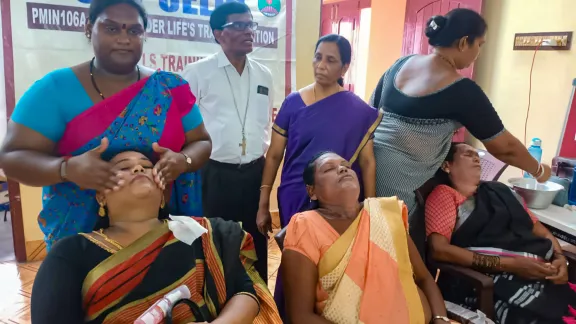
In Chennai, India, the Christ Lutheran Church runs economic empowerment and personal development skills for members of the transgender community. In this photo, Bishop Dr M. Stanley Jose (background, second from left), with some of the students in a beautician course. Photo: CLCÂ
Lutheran church supports transgender community’s right to economic progress and well-being
(LWI) - A skills’ training program by the Christ Lutheran Church (CLC) in Chennai, India, is enabling transgender persons to live with dignity, self-respect and economic independence. When the initiative began in 2020, the goal was to support at least 60 destitute people annually. Just one year later, that number had risen to 75, and today more than 200 people have gone through the program.
In March 2022, the most recent group of trainees received certificates and licenses to operate motor bike taxis, set up beauty salons, create jewelry and produce decorative jute bags. The Lutheran World Federation (LWF) has been supporting the CLC project since it started in January 2020.
“With the church’s support, I have set up my own salon at home and I now help people to look beautiful,” says beautician Swetha, who was born male but identifies as female. She continues: “Not only have I started to live a dignified life by working on my own, I no longer need to worry about food, shelter, and health care. I thank the Lutheran church for their commitment in helping the marginalized.”
A transgender person is someone who does not identify with the sex they were assigned at birth. India has an estimated 4.8 million transgenders, according to government statistics, but the figure could be higher. Though officially recognized by the government, transgender people in the country are still stigmatized and marginalized. In Chennai the CLC works in collaboration with the Transgender Rights Association (TRA), which advocates for the rights of transgender people as prescribed in India’s constitution.
Breakthrough
Swetha could not have imagined a breakthrough in her life. She left her rural home setting more than 10 years ago, “depressed emotionally and mentally.” Unable to bear the constant abuse and beatings from her siblings and their parents’ concern for the family’s dignity after disclosing “that my biological sex does not match my physical and social changes,” she travelled to Chennai. There she joined fellow transgenders, and lived from begging at railway and bus stations, and busy market places, until she came into contact with the TRA, which recommended her to the Lutheran church.
Like Swetha, Idhayakani, who was born female but identifies as male, experienced childhood abuse and rejection, which pushed him to Chennai. Through the CLC training, he recently obtained a driving license and now looks forward to becoming a taxi driver.
“I am happy to learn driving so that I can be able to make sustainable income for survival.”
Peer-to-peer motivation
Apart from the actual skills that each trainee receives, the CLC program incorporates a requirement for peer-to-peer motivational training. Once a person has been trained, they are expected to use their skills to train at least one person in the transgender community and encourage others to join the CLC program. The collaboration with TRC supports the trainees to understand their legal rights, and raise awareness among fellow transgenders.
“As they share their painful past and struggles, and how they became self-dignified persons through hard work and constant practice, their fellow men and women feel encouraged. This has contributed to the successful implementation of the program,” said CLC Bishop Dr M. Stanley Jose. In 2021 alone, 12 motivational training courses in different skills were conducted.
Jose says the activities implemented through the program have significantly contributed to the economic progress and social change of a population group that is still marginalized in spite of the protection guaranteed under the country’s constitution. “These life-changing training programs have helped them overcome discrimination and disgrace by the general public. Instead of begging, they are now able to work and live a dignified life. They are happy to eat nutritional food, wear decent clothing, and be able to pay for rent for better housing,” he noted. “They have also gained self-respect, dignity, confidence and support to address depression, loneliness, rejection, isolation and suicidal tendencies.”
The Christ Lutheran Church community has become an extended family to members of the transgender community, the bishop adds. Through the youth, women and men fellowship groups, congregation members reach out to transgender people in their local community and offer generous contributions to ensure the project is sustainable.
By LWF/P. Mumia
Christ Lutheran Church is one of the 12 LWF member churches in India. Led by Bishop Dr M. Stanley Jose, it has 6,260 members and it joined the LWF in 2018. It also belongs to the United Evangelical Lutheran Churches in India.
Through its member church projects’ portfolio, the LWF supports churches in their efforts to provide hands-on solutions to pressing needs in their congregations and wider community. The priority projects identified by the churches include theological training, advocacy for human rights, health service delivery, livelihood initiatives, and women’s and youth empowerment.


